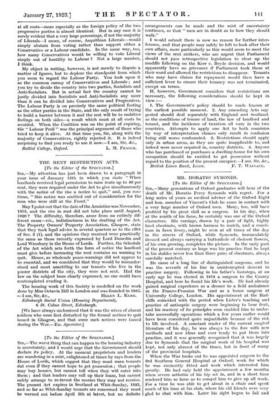THE RENT RESTRICTION ACTS.
[To the Editor of the SPECTATOR.] SIR,—My attention has just been drawn to a paragraph in your issue of January 18th in which you state " When landlords received legal permission to raise rents up to 40 per cent. they were required under the Act to give simultaneously with the notice of the rise a notice to quit," and, you con- tinue, " this notice was omitted out of consideration for the men who were still at the Front." • May I point out that the date of the Armistice was November, 1918, and the rise in rent did not take place until August, 1920 ? The difficulty, therefore, arose from an entirely dif- ferent cause—viz., indistinctness in the drafting of the Act. The Property Owners' Property Association, Glasgow, state that they took legal advice in several quarters as to the effct of Sec. 3 (1), and the opinions they received were practically the same as those recently expressed by Lord Dunedin and Lord Wrenbury in the House of Lords. Further, the Schedule of the Act which sets forth the form of notice the landlord must give before increasing the rent contains no warning to quit. Hence, as wholesale peace-warnings did not appear to be essential, and we considered that they would be misunder- stood and most unsettling to our tenants who live in the poorer districts of the city, they were not sent. Had the law on the subject been clearly expressed; no one could have contemplated evading it.
The housing work of this Society is modelled on the work done by Miss Octavio, Hill in London and was founded in 1885.
6 St. Colme Street, Edinburgh.
[We have always understood that it was the wives of absent soldiers who were first disturbed by the formal notices to quit issued in Glasgow, and that some such notices were issued during the War.—En. Spectator.]










































 Previous page
Previous page